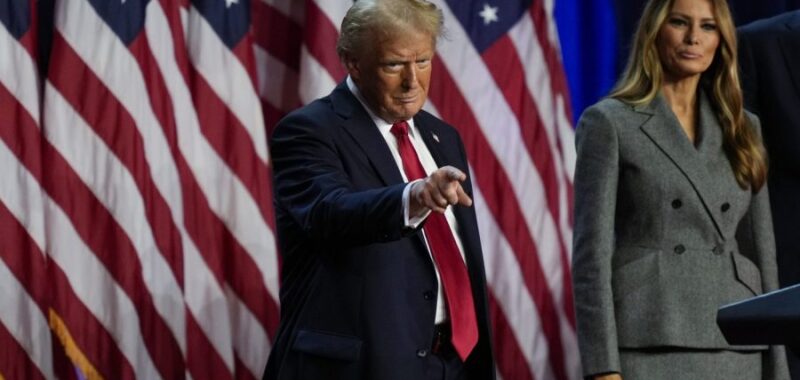
This year’s presidential race was high stakes for pollsters, following their misfires in 2016 and 2020. They collectively anticipated a close race this time — projections that proved largely accurate, notably in swing states where former President Trump built narrow leads to win a non-consecutive second term in the White House.
Pollsters came close to pegging voters’ support for Trump in Pennsylvania, Wisconsin, North Carolina and Georgia, all of which he carried in defeating Vice President Harris. Trump leads in three other vigorously contested battleground states: Michigan, Arizona and Nevada.
Complete results were still to be tabulated in most states by Wednesday morning. But enough votes have been counted to make clear that Trump exceeded polling averages by about 2 points in winning Pennsylvania and North Carolina, by about 1.5 points in Wisconsin, and by 1 point in Georgia.
Those are all enviable results for pollsters. At the end of the campaign, the RealClearPolitics average of polls indicated that Trump was narrowly behind in Wisconsin and slightly ahead in Pennsylvania, North Carolina and Georgia.
A sweep by Trump of the seven battlegrounds would match projections by the polling firm Atlas Intel, which estimated that the former president was ahead in all those states as the campaign neared its end.
Nationally, Trump’s popular vote lead stood at 3.6 percentage points early Wednesday, a margin that likely will shrink as complete returns from heavily Democratic California are compiled. The RealClearPolitics average at campaign’s end showed Harris leading nationally by 0.1 percentage point.
A pressing question in survey research this year has been whether polls would accurately gauge popular support for Trump, who — much to the discomfiture of pollsters — had out-performed expectations set by surveys in the previous two elections. As a response, many survey organizations had modified or adjusted their sampling techniques in the aftermath.
Pollsters likely will cheer this year’s results, which are not remotely as shocking as those of 2020 when, overall, the polls turned in their worst performance in 40 years. Four years ago, several news media polls, including those conducted for CNN and NBC News, anticipated landslide-size, double-digit victories for Joe Biden. He won the presidency by 4.5 percentage points.
However, the single most-discussed poll of the fall campaign — a survey released Saturday indicating Trump had fallen 3 percentage points behind Harris in reliably Republican Iowa — proved dramatically off-target.
That poll, conducted for the Des Moines Register by J. Ann Selzer, whose work has been widely praised in the survey research field as top-notch, prompted shock, surprise and considerable discussion among pollsters and pundits. The implication of the poll was that by flipping a state with Iowa’s partisan makeup, Harris could be headed for a sweeping victory nationally.
But Selzer’s survey missed the Iowa outcome by almost 17 percentage points, in what was an astonishing and memorable miss.
The Register reported last night that “Republicans were eager to tout Trump’s victory [in Iowa] and bash the poll.” The newspaper quoted the Republican state party chair Jeff Kaufmann as declaring at an election-night watch party, “Ann Selzer’s wrong! The Des Moines Register’s wrong!”
That outcome represented vindication for Emerson College polling, which released its final survey of Iowa voters about the time Saturday when Selzer’s poll was made public. The Emerson poll estimated Trump was ahead by 10 points.
This year’s campaign produced more than a few notably off-target predictions based on intimations rather than survey data.
Filmmaker Michael Moore, for example, wrote in early October that Harris would win the election by a double-digit margin — based on a feeling. “My own gut reaction is that there will be an uprising of women at the polls, handing Trump a historic defeat in which Harris could win it in a landslide,” Moore predicted.
After Trump ranted and verbally rambled during his debate in September against Harris, Republican commentator Frank Luntz said, “I think that he loses because of this debate performance.” Late-night talk-show host Bill Maher offered a similar assessment, saying after the debate, “I just think he’s going to lose.”
As the presidential race reached its end, the Washington Monthly posted an essay online, that carried the headline: “The election may not be close at all.” The essay identified several factors, including “one of the nimblest and most disciplined electoral operations in memory,” that pointed to a promising showing for Harris.
W. Joseph Campbell is a professor emeritus at American University in Washington, D.C., and author of seven books, including most recently, “Lost in a Gallup: Polling Failure in U.S. Presidential Elections.”

